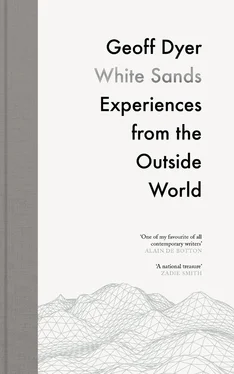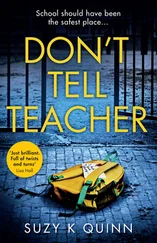I soon had something else to fret about. I’d left my phone at the hotel, in my shorts, and so Min — obliging as ever — called Li and fixed up a rendezvous. It was at a bar, only twenty minutes away, and Jun, Min and Wei were all coming too. Not quite how I had envisaged the rest of the evening panning out, obviously, but perhaps it wasn’t a bad idea to dilute my eagerness, to prevent it acquiring a touch of desperation. We found a taxi immediately; the roads were almost empty. For ten minutes we sped along, then were obliged to slow to a crawl before crawling to a halt as the traffic congealed around us. We were still in the car an hour later, had waited twenty minutes to make a left turn — the lights turned to green for less than thirty seconds — onto the road the bar was on. If we’d known this we could have jumped ship, walked to the bar in five minutes and saved fifteen — a quarter of an hour. Except, even when we did get out, on the street itself, the bar was nowhere to be seen. It was a street full of bars — horrible places, some with pole dancing, all crowded with young youth, the youthful young — like a shinier, slightly less ghastly incarnation of Camden Town. Surely she wouldn’t have chosen one of these bars. And if she had, then where the fuck was it? Where was she ? More time ticked pointlessly away. A minute was like five minutes. Ten hours from now I’d be on a flight to London. Then I saw her, waving as she had that same morning in the Forbidden City, minus the shades. She was wearing a blue dress, shorter than the one she’d worn earlier. Darker too, knee-length, but also sleeveless, revealing the same shoulders and arms. No wonder we hadn’t been able to find the place: she was outside a nail bar. I looked down at her feet, her sandals, her toes, her blue nails. Min introduced Jun and Wei to Li and we followed her along a passageway to the side of the nail bar. We came to a dented grey elevator, large enough to accommodate a patient on a gurney in an under-funded hospital, with weary staff and several anxious family members. The doors squeezed shut; the elevator shuddered upwards until the doors opened again to reveal a dim landing lacking all distinguishing features except some partially erased graffiti. It was an evening when one kind of disappointment followed swiftly on the heels of another, interrupted by surges of hope and renewed expectation. I followed Li up a flight of concrete stairs, the muscles in her calves flexing as she took the steps. But where was she taking us? To a crack den?
No! To a rooftop bar. When we emerged into the hot night, it was like a dream of Ibiza, one of the wonders of the nocturnal world.
‘What’s it called, this place?’ I asked.
‘It is the Bar of Mental Cultivation,’ she said. ‘Did you not see the sign?’
‘I’m pretty sure there was no sign. But maybe I was looking for the wrong sort of sign. Like the Dog and Duck.’ It was a pub joke, wasted on Li.
The bar was surrounded on three sides by high-rise office buildings, gleaming and new — some so new they were not even finished. On the fourth side the city stretched away forever: neon-topped skyscrapers, the blinking lights of planes. The music was not loud. She had chosen the perfect place, but it was not quite perfect: there was nowhere to sit. Li introduced two friends, both women, who had been here a while, trying without success to secure a table. The best option was for us all to crowd into the psychedelic pod in the middle of the roof, on cushions, but that would have been like sitting inside, not out in the night with the stars overhead. These stars were nowhere to be seen, there was too much light pollution for that — come to think of it, where had last night’s moon got to? — but the light was not pollution at all, it was its own kind of magic. We milled around in a way that was like a standing version of being back in the car, close to where we wanted to be, but stuck at a frustrating remove from it. There were a few empty chairs scattered around, not enough to combine and seat a party of seven. Then a large group, all male, Chinese and Western, got up to leave, vacating a large sofa and some chairs. Li pounced. Once Jun had grabbed two extra chairs we were in place, all of us together around a low table — with me seated next to Li on the sofa, without seeming to have done so deliberately.
A waiter took the complicated drinks order: beer, cocktails, gin, wine. Now that we were settled, with drinks on the way, everyone was re-introduced. One of Li’s friends turned out to be her sister.
‘You don’t look at all alike,’ I said. Her face was angular, sharp, almost hard.
‘She is not real sister,’ said Li. ‘She is cousin-sister.’ The cousin-sister was a dancer, though she looked too tall to be a dancer. And she’d just had a baby. The waiter came back with a tray loaded with glasses, bottles, ice, drinks. Li had ordered a Singapore Sling (‘whatever that is’); I was drinking beer. Min proposed a toast to me and Jun. As soon as we had all clinked glasses I offered one back—‘To the Chinese century!’—and we all clinked again. The beer was only Tsingtao but it was cold, wonderful, tasted OK. For the first time since leaving the Forbidden City, I was able to give myself entirely to the moment. But if a moment is this perfect there is a need to preserve it, to photograph it. When people are having a good time they take pictures to show and prove they’re having a good time. Everyone was taking pictures, not just the people in our group, but all around. What’s the point? These pictures never capture the magic of magical evenings, they just show people getting red-eyed drunk and taking pictures of each other, but the act of taking the pictures is part and proof of the moment. It was something I associated with the young, but Jun was at it too. The difference was that he was using a proper camera, not just a phone, and taking considerable care, altering the focus and aperture. At one point he changed the lens in an unobtrusive, unfussy way, still holding his beer, not talking. Then he got up and left the table and walked away, continued photographing at a distance. When he sat back down he passed around the camera so that everyone could see the results.
They were fantastic. I had never been in a situation where something I was experiencing had been caught so perfectly on film. These were pictures of the inside of my head. The photographs were beautiful but, everyone agreed, the best ones were of Li’s cousin-sister. The colours were slurred, gorgeous, drenched. In one picture there was a yellow smear of light and, to the right, a string of blurred blue dots stranding her in shadowed clarity. Had Jun known what the result would be? If so, how had he done it?
‘He must be in love with her!’ I said, answering my own question. This romantic and technologically ignorant reaction was also a vicarious declaration and attempted deflection of what might have been obvious to everyone. If you were to fall in love with someone, on a rooftop bar in Beijing, this was what it would look like. Or was it just the camera that was in love with the cousin-sister? I’d read that Muhammad Ali, along with his other attributes, had the perfect face for a boxer, with rounded features that made him less susceptible to cuts. Li’s cousin-sister had the opposite kind of face: angular, sharp-featured. The camera didn’t glide or slip from her face in the way that punches slid off Ali’s. It clung to her as you hang on someone’s every word when you are falling in love with them. The shutter speed, presumably, was however-many-hundredths of a second, but something about her face meant that the camera held it fractionally longer and, in the process, softened it. Her face allowed, even encouraged the camera to do this, to bring her inner life to the surface. She was removed, not quite there. Maybe she was thinking of the child at home? She looked — and again the softened sharpness of her features played a part— abstracted . Maybe this was what Jun had noticed, that her face had that special quality or capacity.
Читать дальше












